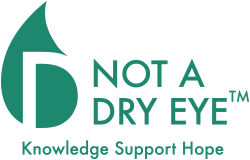There’s a scene in the 2016 movie Miracles from Heaven that’s probably all too familiar for some Dry Eye patients. When 5-year-old Anna Beam goes to the ER for the umpteenth time with stomach pains, the doctor says it’s acid reflux. Anna’s mother, frustrated to no end by what she knows to be yet another wrong diagnosis, demands that the doctor run more tests because she’s not leaving until she knows, for certain, what’s wrong with her daughter. It turns out not to be acid reflux at all.

Medical research doesn’t always bet on the right horse, but medical research is what doctors rely on to inform the care they provide. Not that long ago eggs were the enemy. So was fat of any kind. Now we know that the decades-old study starting the trend that demonized fat was sponsored by, of all things, the Sugar Research Foundation (SRF).
Fat vs. Sugar
According to Sugar Industry and Coronary Heart Disease Research: A Historical Analysis of Internal Industry Documents, the SRF funded a literature review that was published in the New England Journal of Medicine back in 1965. That paper
singled out fat and cholesterol as the dietary causes of coronary heart disease (CHD) and downplayed evidence that sucrose consumption was also a risk factor. The SRF set the review’s objective, contributed articles for inclusion, and received drafts. The SRF’s funding and role was not disclosed. Together with other recent analyses of sugar industry documents, our findings suggest the industry sponsored a research program in the 1960s and 1970s that successfully cast doubt about the hazards of sucrose while promoting fat as the dietary culprit in CHD.
What does this say about studies funded by industries in other fields? Remember how the tobacco industry convinced doctors to prescribe cigarettes for anxiety in the 50’s and 60’s?
You can’t help but wonder about the results of studies sponsored by companies, and other stakeholders, that make the products they’re studying. Can we really believe there’s no conflict of interest? Can we know, for certain, that important data isn’t suppressed?
Finding it Hard to Trust Your Doctor
The Harvard sugar study isn’t the only example of medical research, and consequent medical care, that touts questionable, or outdated, facts. Regardless, these studies are what many doctors use to inform the care they provide. But when the studies aren’t good, or up to date, you might not get the care you need.
And then, bewildered, you might even end up finding it hard to trust your doctor, the way Anna’s mother did. It happens to Dry Eye patients all the time, especially to those of us who’ve gone from doctor to doctor to doctor, first just seeking care, and then later a “miracle.”
A Miracle for an Insurmountable Problem
But why does it have to get to that — seeking a miracle? Why does getting help for Dry Eye suddenly become an insurmountable problem?
We’re not really sure.
But maybe it’s because doctors aren’t experienced in treating Dry Eye and meibomian gland dysfunction as a unit, with a truly comprehensive approach to managing the signs and symptoms of these diseases.
Take for example the American Academy of Ophthalmology’s guidelines for these two conditions that often co-exist and overlap: Dry Eye and blepharitis. The academy publishes one Preferred Practice Pattern (PPP) for Dry Eye Syndrome and another PPP for blepharitis.
If a doctor refers to one, but not the other, the picture won’t be complete. It’s not that the guidelines are inaccurate per se (although they’re already out of date having been published in 2013 — a problem in itself). It’s that individually they’re not comprehensive enough to cover anything and everything that might be going on. One document just doesn’t go deep enough to describe all of the possible underlying or co-morbid conditions, and the latest effective treatments.
As a result, the care you receive could be inadequate. And so in addition to not feeling better after seeing who-knows-how-many doctors, you’re now finding it hard to trust your doctor, even a really good doctor, and maybe even the entire medical profession.
And that’s a fundamental problem. Because we need to trust our doctors, good doctors, who diagnose and treat us, so we don’t have to wait for miracles like little Anna Beam.
Send your questions and comments to blogger@notadryeye.org.
Subscribe to our blog to keep up with Not A Dry Eye.
Support Not A Dry Eye Foundation by shopping on Amazon. When you shop at smile.amazon.com, Amazon donates 0.5% of your purchase.

